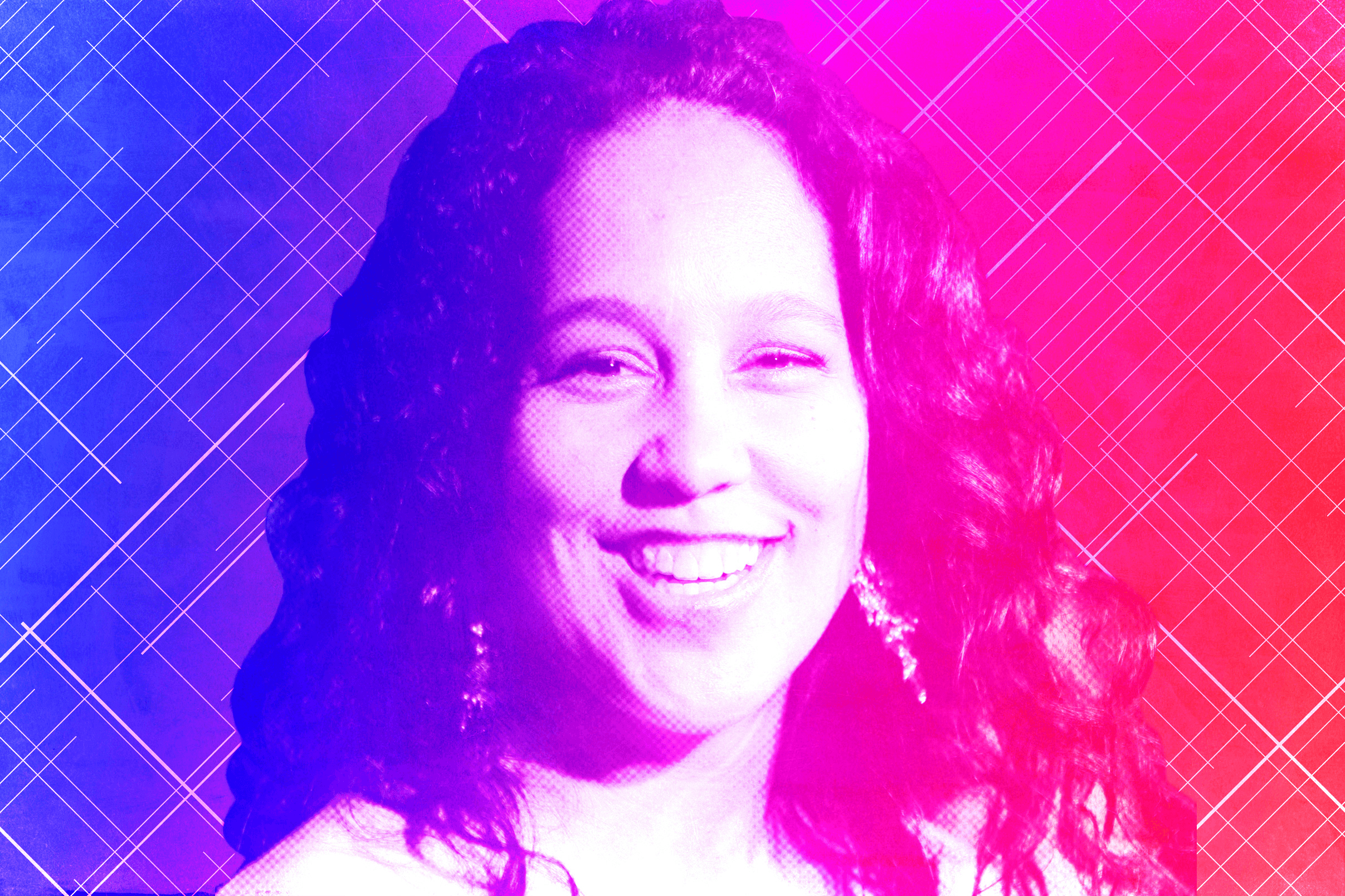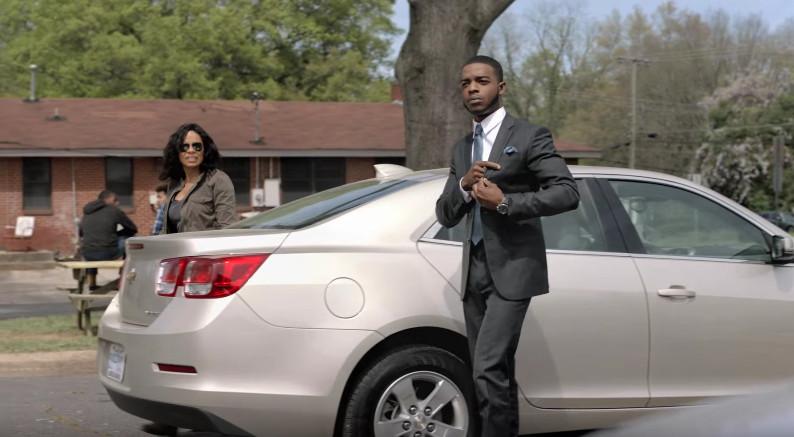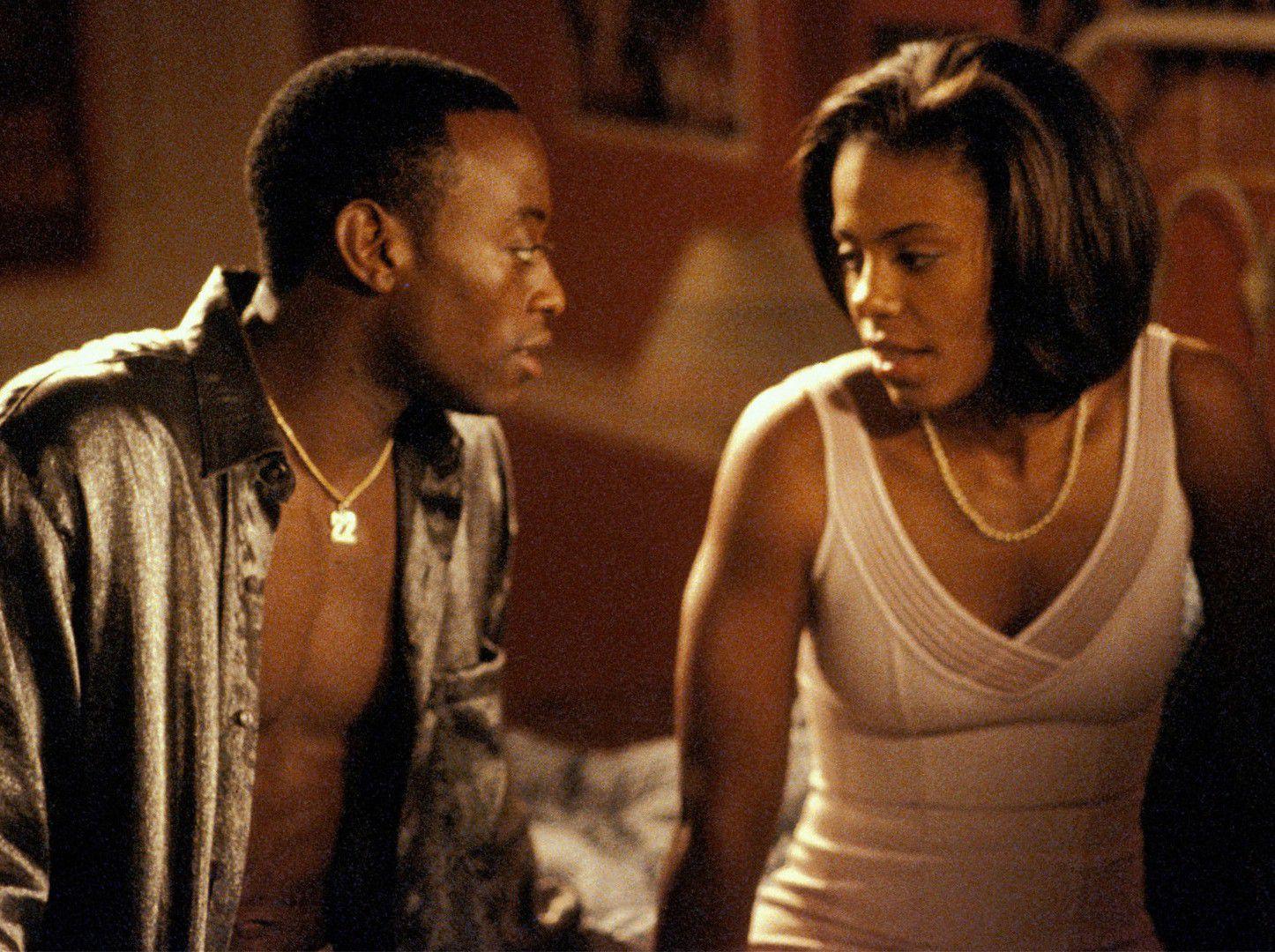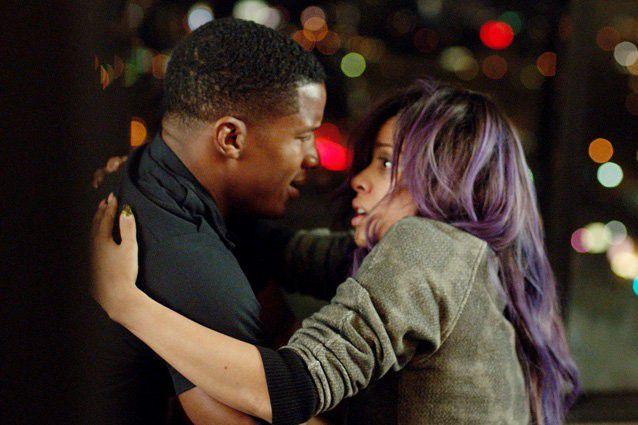
Early in the first hour of Shots Fired, after the first tense shooting but before the juicy vase-throwing catfight, there’s a nice, quiet slice of family life. Ashe (Sanaa Lathan) sits on her daughter’s bed, and the two play a game together before bedtime. They’re happy, normal; it’s a relaxed moment. The camera picks up details of the little girl’s life: her cheerful bedspread, her stuffed animals, her soccer trophies, a white wooden sign that says “Girls Rule!,” and then, crucially, a poster of Serena Williams hanging over her bed. The last detail is not something you’d really linger on, unless you know the sorts of stories writer/director Gina Prince-Bythewood likes to tell.
“I love that you noticed Serena,” exclaims Prince-Bythewood, but softly. (She’s soft-spoken, even when excited.) The poster is an Easter egg that means a lot to her. “I love everything Serena represents. She’s such a badass, and she demands your respect and she works hard. People get on her and call her cocky, but she’s the best in the world. And if you’re not trying to be the best, what are you trying to be?”
“Of course you would want your daughter to be that,” Prince-Bythewood says of selecting the Serena image for the scene. “And not just black women, but really any woman should want her daughter to aspire to that. Who wouldn’t relate?”
At this point, a young girl aspiring to be Serena Williams should be completely universal, a common shorthand for awesomeness. But when Prince-Bythewood asks about Serena’s potential appeal, it’s not just a rhetorical question; she makes it a concrete part of her work. Since her feature film directorial debut in 2000, Prince-Bythewood has told stories about black people — stories she wants to see, stories that represent the world she lives in. With each project, she asks audiences and Hollywood executives alike: Who wouldn’t relate to this story?
To be more specific: Who couldn’t identify with Love & Basketball’s Monica, a young black female athlete torn between her career and Omar Epps’s torso? What decent person wouldn’t root for a 14-year-old black girl trying to connect to some figment of her mother’s memory, as in The Secret Life of Bees? Why wouldn’t someone empathize with a black woman who feels trapped in her life and dreams of more, as Noni does in Beyond the Lights?
With Shots Fired, the Fox series that Prince-Bythewood created with her husband, writer Reggie Rock Bythewood, she’s asking a slightly more urgent version of the same question. This time, her subject is a police shooting in a small town reminiscent of Ferguson, Missouri, and the show is challenging the audience to think about race, the judicial system, and the reality of America in 2017. The sad fact is that all audiences can, in one way or another, find themselves in the racial pressure cooker that Shots Fired presents. The pressing question — especially with a show that has such potential to alienate — is whether they’ll choose to put themselves there. But after years of turning the specific black experience into the universal, Prince-Bythewood is determined not only to tell these stories, but also to make sure everyone — no matter what color they are — will watch it.

I am waiting for Prince-Bythewood in the restaurant of New York’s London Hotel; her lunch is waiting, too. Prince-Bythewood and her husband, Reg, as she affectionately calls him, are running behind schedule, so her Uno’s pizza, delivered by her assistant, has arrived first. It’s been a whirlwind couple of days for both Gina and Reg; in addition to tag-teaming interviews, shoots, and appearances in advance of the show’s Wednesday premiere, they were also celebrating their son Cassius’s birthday.
Of all the projects the Bythewoods have worked on — from when they met (and fell in love) as writers on A Different World, to Notorious (his), to Love & Basketball and Beyond the Lights (hers) — one that dives into the politics of the Black Lives Matter movement seems like it’d be the hardest to get made. The Bythewoods say no.

“I think this is one of those perfect collisions of desire and opportunity,” says Prince-Bythewood a few minutes later, when she sits down in front of her pan pizza. They weren’t looking to do television when Fox came knocking. “[George] Zimmerman was percolating in our house,” Prince-Bythewood recalls, referring to the Florida man who shot Trayvon Martin. “We thought about it. It’s like, OK, here’s an opportunity where we can create a show. We want to talk about this, and we can tell this story over 10 hours, as opposed to two, and we can put it on network television, which has an incredible reach. It just made perfect sense.”
Shots Fired is a crime drama examining the aftermath of two racially charged shootings in a small North Carolina town. One incident involves a young black cop (Tristan Mack Wilds) who shoots a white college student and becomes the center of a high-profile investigation; the other follows an unfortunately more familiar narrative: black teen, white cop, little done in the way of justice being served. The show toggles between the perspectives of all the people involved: from Ashe, Lathan’s troubled but sharp big-city investigator; to the cops at the small, predominantly white local station; to the governor’s office; to the churches; to the homes of the white and black families involved. “It’s almost like an autopsy of a small town,” says Reggie Bythewood.

As expansive as the show is, the catalyst for the script comes from something more intimate: trying to explain the Trayvon Martin shooting to their Cassius. “To be clear, this show is absolutely personal and it’s absolutely for our two boys,” says Prince-Bythewood.
“I watched [the Zimmerman trial] with our older son, who was 12,” explains Reggie Bythewood. “And the shock that he felt after seeing this guy get off for killing a kid — Cassius couldn’t wrap his head around that. I showed him an Emmett Till documentary, and that was our way of consoling him but also saying, ‘It’s not going to be OK, it’s not all right, this has been happening throughout history.’”
“After that conversation Reg had, our son wrote a short story about Trayvon Martin going to heaven and meeting Emmett Till,” adds Prince-Bythewood. “That short story he wrote is actually in Hour 5, so Cassius was the first writer on Shots Fired.”
The Bythewoods begin telling me about something they called Shots Fired University — the extensive two-week research boot camp they went through with their writers — but the conversation keeps coming back to how personal this show is for them. Reggie talks about his own experiences with police officers: being stopped down the street from his Los Angeles home because he had a broken taillight or was speeding. He remembers how mystifying it was for their son to grow up reciting Martin Luther King Jr.’s “I Have a Dream” speech, but to know only a world with a black president. Prince-Bythewood mentions that the HBO documentary 3 ½ Minutes, 10 Bullets, which examines Florida’s “Stand Your Ground” law through the killing of 17-year-old Jordan Davis at the hands of Michael Dunn, broke her heart. She talks about their conversations with Wanda Johnson, the mother of slain Oakland father Oscar Grant, and how she could never imagine the grief of losing a child. I join in, talking about living in Oakland right after the Oscar Grant shooting and what it was like being in the early wave of protests. We’re three black people having a conversation, full of silent exchange — nods and grimaces and head hangs.

It’s a conversation the Bythewoods hope lots of black people have after watching this show, which makes sense: It feels like a distinctly black conversation. While promoting the show, the cast and crew have hosted screenings and discussion groups in mostly black communities around the country — Atlanta, Detroit, Washington, D.C. The night before our lunch, they’d hosted a screening and Q&A for a mostly white audience at New York’s 92nd Street Y. I ask them if there’s been a difference in how audiences have received the show.
Prince-Bythewood looks at her husband, and they have some sort of silent conversation. She answers, “I mean, people want to talk about it after the screenings, and that didn’t change. I think it was just — I think the black audiences feel more empowered maybe to laugh. That it’s OK to laugh. We put some funny things in there, but they’re more comfortable laughing at certain things.”
Reggie Bythewood adds, “Last night somebody in the audience did ask a fair question, which was that, who we do think the show is for. Is it just for black audiences, is it for everybody?”
So who is it for, I ask?
“America,” Reg answers instantly.

It’s easy to see the through lines of Prince-Bythewood’s other work in Shots Fired. The show was a brain child of both husband and wife, and it feels like a true collaboration. Reggie’s influence comes through in every edge-of-your-seat moment — a frenetic crime scene, a particularly contentious interrogation in a police station — and in a fraught crowd scene that re-creates the early Black Lives Matter rallies in Ferguson. And then there are the trademark Gina Prince-Bythewood moments: Serena, for instance. Or a careful, generous shot of Lathan — her muse and friend — dancing. A silent exchange between the mothers of the two slain boys, a particularly assertive car sex scene. (“I need the personal,” she says. “I get bored without it.”) And then, of course, there’s the trademark black female character that Prince-Bythewood writes.
“I put women up on the screen that are unapologetically going after it all, love and career. This is a theme,” she tells me. “There’s Monica, of course, being disparaged early on for being a girl who likes to play sports and learning to accept that and love herself for it.” (That’s Love & Basketball.) “And in Beyond the Lights, Noni is struggling with finding her authentic voice. Even in Secret Life of Bees, I dealt with [a lot] of different characters, finding out who they are, finding their own power or exercising their power.”
Shots Fired continues Prince-Bythewood’s dedication to depicting complex female characters with Ashe, an ambitious and talented investigator struggling with a laundry list of flaws: a failed marriage, a custody battle, the struggle to balance being a good mother and a good cop, self-care, and of course getting a room of men to follow her lead. “Ashe, for example, she’s unapologetically strong and ambitious — and flawed,” explains Prince-Bythewood. “But that makes for more interesting characters … like, I’m not perfect. Reg is close,” she jokes, and then pauses with a half smile. “I hope that everyone can look up on the screen and see themselves reflected.” Reg takes her hand under the table.

I probably wasn’t supposed to see this subtle display of solidarity and affection, but it feels appropriate to mention, because as much as Prince-Bythewood is the patron saint of strong, black female characters, she is also the St. Valentine of black love onscreen.
“How often do you get to see black folks either expressing their sexuality or expressing love or intimacy?” Prince-Bythewood responds when I ask about her romantic story lines. “It’s not that often you get to see it, even on television. It’s a rare thing and we as a people need to see ourselves fall in love and be in love and be inspired by that and aspire to that.” It’s a struggle that Prince-Bythewood knows intimately; her commitment to showing black love was what made Love & Basketball so difficult to get green-lit.

“It was devastating,” Prince-Bythewood told The Huffington Post. “I remember I had a list on my fridge of all the studios and every day crossing another one off. And I kept getting the feedback that it was ‘too soft,’ which I just didn’t know what that meant, how is it soft? But I think part of it was also it was a film with two people of color in the lead in a love story. It wasn’t a comedy. At that time, obviously there was the success of Boyz n the Hood and Menace II Society and this was something definitely different. But again, it was what I wanted to see and what I felt we hadn’t had an opportunity to see.”
Seventeen years later, that movie, which at one point was nearly impossible to sell, is now a classic. I rewatched Love & Basketball recently, and when I got to the crucial sex scene — you know: the post-prom, first-time, press-rewind-several-times scene — I texted several of my friends, “Oh my god. Maxwell.” Every one of them replied instantly: “I know what part you’re at,” or, “Damn, where is my Omar Epps.” The movie is a key text, not just for a certain era of black film, but in the evolution of onscreen relationships as we know them.
Shots Fired debuts at an exciting but complicated moment for black art. We’re still basking in the glow of Moonlight’s Best Picture Oscar win and Jordan Peele is taking multiple victory laps for Get Out’s record-breaking success. It feels like things are going well, for black creators and writers and audiences, a sentiment Prince-Bythwood agrees with — to an extent. “Get Out makes a lot of money, that’s great,” she explains. But there’s still a double standard. “If [a film like Get Out] doesn’t make a lot of money, they’re like, ‘Oh, black film doesn’t work.’ People don’t say, ‘White film doesn’t work,’ because people running studios, people in power, make films that reflect themselves, and that’s the issue.”
She points to statistics recently released by USC Annenberg’s Media, Diversity, and Social Challenge Initiative that revealed that only 7 percent of films had a cast whose diversity reflects the country. And of the top-100 films at the box office every year for the last decade, only 5.1 percent of directors were black, and only three of them were black women: Ava DuVernay, Sanaa Hamri, and Prince-Bythewood.
“It is tough,” Prince-Bythewood says. “The numbers don’t lie. It’s a fight every single time. It’s a fight. Yes, the access to the people who can green-light are more open to me and Reggie, but it’s still a fight every time to preserve a black cast, to bring these stories to life. But it’s important. For a long time we’ve been invisible, and to be able to put us on there and to be able to see ourselves reflected, is so important to our self-esteem, and to our survival, really.”

Prince-Bythewood also recognizes her own power to hire and promote black women in her cast and crew: Lathan, obviously, and Aisha Hinds (from Beyond the Lights), whose character was originally written for a man. Prince-Bythewood can go down a list of all the “dope” women she employs: directors, film editors, sound editors, producers — in fact, half of the episodes on Shots Fired are directed by women.
“I don’t think enough people realize it, but that’s OK — well, it’s not OK. I work with the same people constantly, but they make me better; they’re so good. Their résumés are not as long as others, but it’s not because of talent; it’s only because of opportunity. So this industry is just warped in that way; it’s warped.”
In an interview with NPR a few years back, Prince-Bythewood spoke about her desire to “obliterate the term ‘black film,’” a statement that seems in direct conflict with her career and film legacy.
“That’s one thing that was taken a bit out of context,” she explains at lunch. “Obviously, we make films with black folks … we can’t deny that. That is what we do and what we put onscreen. My issue is more with Hollywood, who use that as a genre; I want it to be every genre. Reg is doing a film now that’s a sports film. My next one is a thriller. But Hollywood would say they’re both black films. I want to get to the point, where they say go see 12 Years a Slave because it’s this kind of film, go see Beyond the Lights because it’s a love story, go see Get Out because it’s a horror thriller, Moonlight because it’s a beautiful coming-of-age story. They are all different kinds of stories, but they market them as black and not any other way.”
What excites her most about her future, and the future for black creators, is the idea of visibility. She’s directing Marvel’s Cloak & Dagger, and she just signed on to direct the film adaptation of Roxane Gay’s An Untamed State, starring Gugu Mbatha-Raw from Beyond the Lights. She has more plans; one day she wants to make a film about her dream subject, Toussaint Louverture, whom she calls the black Braveheart. “It’s an incredible story that I would love to give to my boys, Cassius and Toussaint, and give to us — so we can see our people fighting back, getting away from the victim narrative we’ve been taught growing up.”
Prince-Bythewood already knows how she’ll pitch it. “They can market it as a heroic period story. That’s the key, and you hope all people will come see it.”